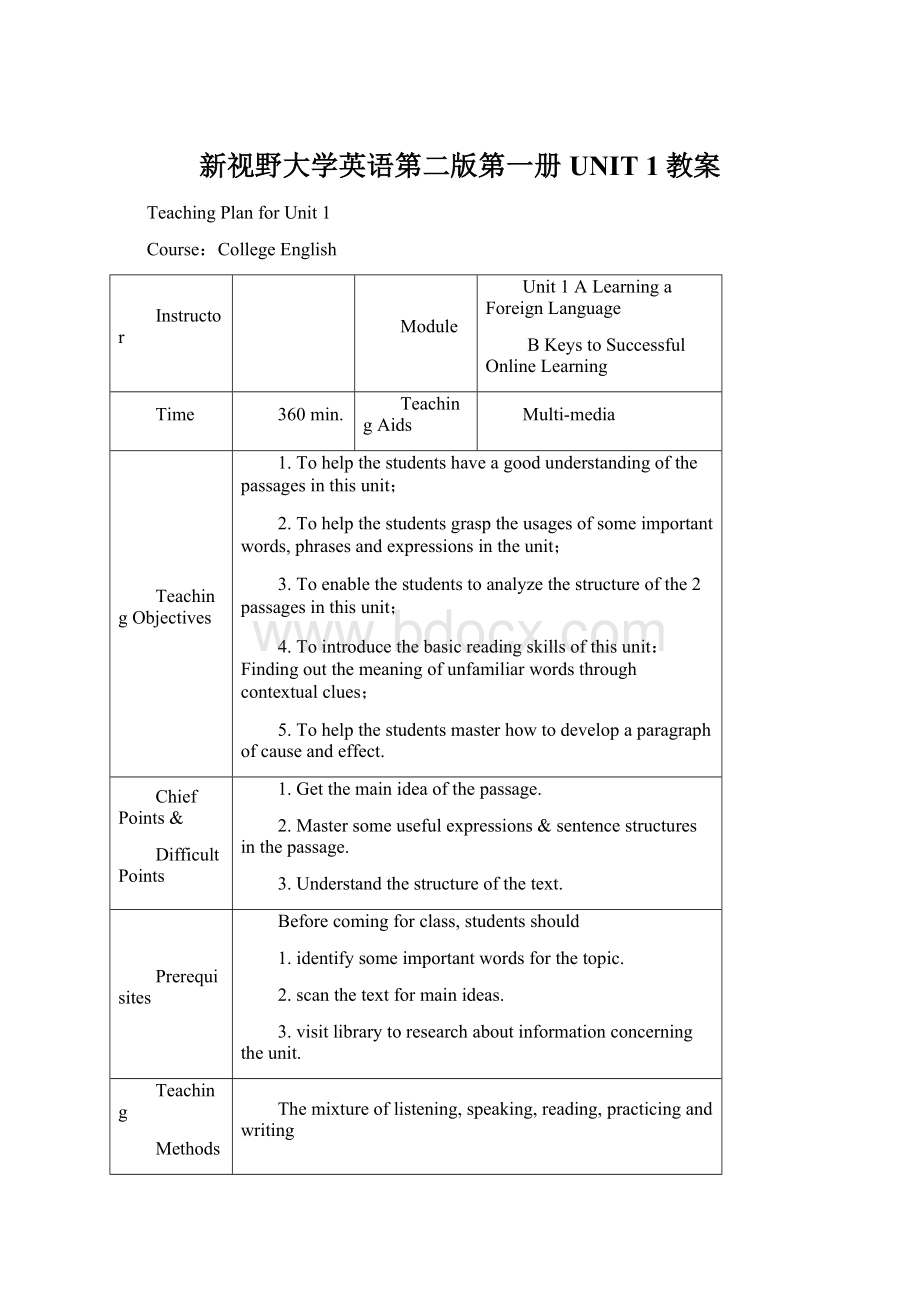新视野大学英语第二版第一册UNIT 1教案.docx
《新视野大学英语第二版第一册UNIT 1教案.docx》由会员分享,可在线阅读,更多相关《新视野大学英语第二版第一册UNIT 1教案.docx(50页珍藏版)》请在冰豆网上搜索。

新视野大学英语第二版第一册UNIT1教案
TeachingPlanforUnit1
Course:
CollegeEnglish
Instructor
Module
Unit1ALearningaForeignLanguage
BKeystoSuccessfulOnlineLearning
Time
360min.
TeachingAids
Multi-media
TeachingObjectives
1.Tohelpthestudentshaveagoodunderstandingofthepassagesinthisunit;
2.Tohelpthestudentsgrasptheusagesofsomeimportantwords,phrasesandexpressionsintheunit;
3.Toenablethestudentstoanalyzethestructureofthe2passagesinthisunit;
4.Tointroducethebasicreadingskillsofthisunit:
Findingoutthemeaningofunfamiliarwordsthroughcontextualclues;
5.Tohelpthestudentsmasterhowtodevelopaparagraphofcauseandeffect.
ChiefPoints&
DifficultPoints
1.Getthemainideaofthepassage.
2.Mastersomeusefulexpressions&sentencestructuresinthepassage.
3.Understandthestructureofthetext.
Prerequisites
Beforecomingforclass,studentsshould
1.identifysomeimportantwordsforthetopic.
2.scanthetextformainideas.
3.visitlibrarytoresearchaboutinformationconcerningtheunit.
Teaching
Methods
Themixtureoflistening,speaking,reading,practicingandwriting
ReferenceBooks
Teacher’sBookofNewHorizonCollegeEnglish
LongmanDictionaryofContemporaryEnglish(English-Chinese)
OxfordAdvancedLearner’sEnglish-ChineseDictionary
LongmanDictionaryofAmericanEnglish
TeachingContents
TimeAllotment
SectionA
I.Warm-upActivity
1.TopicDiscussion
i.Student’sDiscussion
ii.Teacher’sSummary
2.QuestionsontheTopicandthePassage
II.BackgroundInformation
IIII.TextStructureAnalysis
IV.StructuredWriting
V.DetailedStudyoftheText
i.WordsandPhrasesStudy
ii.LanguagePoints
VI.TextSummary
1.Student’sPresentation
2.Teacher’sSummary
VII.After-textAExercises
360m
90
40
10m
10m
20m
50m
30
90
35
55m
30m
30m
Assignments
1.HandintheexerciseofTRANSLATION.
2.Finishtheotherafter-textA&Bexercisesafterclass.
3.SupplementaryExercises
i.English-ChineseTranslation(5sentences)
ii.Chinese-EnglishTranslation(10sentences)
4.PreviewUnit2
Unit1
SectionALearningaForeignLanguage
I.Warm-upActivity
1.TopicDiscussion
i.Student’sDiscussion
(Tasksstudentstodiscussthefollowingtopicsonthepassage.)
1)What’syouropinionaboutlearningaforeignlanguage?
―difficult,hard,interesting,useful,etc.
2)Howdoyoulearnaforeignlanguagenormally?
―listeningtotheradio,learningfromteachers,havingclassesinlanguagetrainingschools,onlinelearning,etc.
ii.Teacher’sSummary
Infact,almosteveryonecanrealizethatitisessentialtolearnaforeignlanguage,especiallyEnglish.While,notallpeoplelearnitsmoothly,someonecanlearnitsuccessfully,yetsomeonefails.IbelievelearningEnglishisnotsohardassomestudentsthinkandyoumayfindyouwillliketolearnitgraduallyifyoufindahelpfulmethodtohelpyou.,justlikethelearnerinsectionA.
2.QuestionsontheTopicandthePassage
1)DidthewriterenjoylearningEnglishinjuniormiddleschool?
Why?
―Yes,hedid.Heenjoyedlearningitbecausehisteacherwaskind,patient,andusedapositivemethodofpraisingstudents.
2)Whythewriter’slearningattitudechangedafterenteringseniormiddleschool?
―Becausehisseniormiddleschoolteacherwasnotaskindashisjuniormiddleteacher.Hisseniormiddleschoolteacherwouldpunishstudentsformakingmistakes.Asaresult,hedidnotwanttospeakEnglishinclassandheimprovedverylittle.
3)Tothewriter,isthereanydifferencebetweencollegeandjuniormiddleschoolinlearningEnglish?
―Yes.Thedifferenceswerethathedidn’thaveasmanyopportunitiestoaskquestionsincollegeandthatotherstudentsintimidatedhim.
4)Whatdidthewriterfeelwhenhewastakinganonlinecourse?
―Thewriterdidn’tfeelintimidatedwhenhewastakinganonlinecoursebecausehecouldtakemoretimetothinkmoreabouthisanswersbeforepostingthemonscreen.
5)Isthewriter’sexperienceinlearningaforeignlanguagemeaningful?
Why?
―Yes,itisverymeaningful.Learningaforeignlanguagetaughthimthevalueofhardwork.Inaddition,ittaughthimaboutanotherculture,openedhismindtonewwaysofdoingthings,andallowedhimtocommunicatewithmorepeople.
II.BackgroundInformation
1.Onlinelearning:
Onlinelearning,aformofdistanceeducation,referstolearningandothersupportiveresourcesthatareavailablethroughtheInternet.Inanonlinelesson,studentsworkwithacomputerprogramtoselectthematerialstheyshouldbestudying.Thematerialscanbepresentedastext,graphics,animatedgraphics,audio,video,oracombinationofthesethataredisplayedinWebbrowsersorothermultimediaplayerssuchasWindowsMediaPlayer.
2.Juniormiddleschool:
IntheUS,itreferstoaschoolforchildrenwhoaretwelvetofifteenyearsoldwhileinBritainitreferstoaschoolforchildrenagedseventoelevenyears.
3.Seniormiddleschool:
Itreferstoastageofeducationafterjuniormiddleschoolandbeforecollegeoruniversity.
4.Primaryandsecondaryschool:
BeginsaroundagesixforUSchildren.Theyattendfiveorsixyearsofprimaryschool.Nexttheygotosecondaryschool,whichconsistsofeitheratwo-,three-yearprogramorafour-yearprogram.Thisiscalled“middleschool”or“juniorhighschool”and“seniorhighschool“(oftenjustcalled“highschool”).
III.TextStructureAnalysis
Thepassageisafirstpersonnarrativeabouttheexperiencesoflearningaforeignlanguage.Itismadeupofthreeparts.
PartOne(Para1):
(Thispartmakesthetopicofthereadingpassageclear.)Learningaforeignlanguagewasoneofthemostrewardingexperiencesthewriterhashad.
PartTwo(Para2-7):
(Thisisthemajorpartofthereadingpassage.)Inthispart,thewriterdescribeshislearningexperiencesinfourdifferentlearningstages(i.e.juniormiddleschool,seniormiddleschool,college,andaftergraduating).
Para.2:
Thewriter’sexperienceswithlearningaforeignlanguagebeganinjuniormiddleschool.
Para.3:
Thewriter’sexperienceinseniormiddleschoolwasdifferentfrombefore.
Para.4:
Thewriter’sexperiencesincollege.
Para.5:
WhenthewriterwasofferedanopportunitytostudyEnglishthroughanonlinecoursehislearningsituationwaschanged.
Para.6:
Onlinelearningisnoeasierthanregularclassroomstudy;itrequiresalotoftime,commitmentanddisciplinetokeepupwiththeflowofthecourse.
Para.7:
Thewriterpracticedallthetime.Thoughhewasstillmakingmanymistakes,hehadreapedthebenefitsofallofhishardwork.
PartThree(Para8):
(Itsummarizesthewriter’sexperiencesinlearningaforeignlanguage.)Throughthelearningprocess,thewriterlearnedthevalueofhardwork,gainedinsightsintoanotherculture,andopenedhismindtonewideas.CommunicatinginEnglishhelpedthewriterformnewfriendshipsandbridgethegapbetweencultures.
IV.StructuredWriting
AParagraphofCauseandEffect
Forthisunit,particularattentionhasbeengiventocauseandeffect.Inourdailyconversation,questionswithwhyareoftenaskedandanswered.Thisshowsthatcausalanalysisisverycommon;itissomethingwearefamiliarwith.Thepassageincludessomeparagraphsinwhichthewriterusesacauseandeffecttosupporthispoint.
InParagraph3,thewriterputsforwardhistopicfortheparagraph―Mylearningexperienceinseniormiddleschoolisdifferentfrombefore.Thewritergoesontotelluswhyhislearningexperienceisdifferentfrombefore—”mynewteacherquicklypunishedthosewhogaveincorrectanswers.Wheneverweansweredincorrectly,shepointedalongstickatusand,shakingitupanddown,shouted,‘No!
No!
No!
...’”Thenthisleadstoaneffect—“Itdidn’ttakemelongtolosemyeagernesstoanswerquestions.NotonlydidIlosemyjoyinansweringquestions,butIalsolostmydesiretosayanythingatallinEnglish.”
(TurntoP.15anddotheExerciseXI.FillinthechartforParagraph2,findingthesimilarcauseandeffectrelationship)
V.DetailedStudyoftheText
Words&PhrasesStudy
1.reward
vt.givesth.inreturnforgoodandvaluabledoings奖赏;回报
Healwaysbelievedthatthecompanywouldrewardhimforhisefforts.他总是相信公司会因他付出的努力而奖赏他。
Hewillsoonerorlaterberewardedforhiswickedconduct.他的恶行迟早会受到报应。
n.[C,U]sth.asareturnforgoodandvaluabledoings奖赏;回报
Itisunfairthathegetsverylittleinrewardforhishardwork.他工作很辛苦,报酬却很少,这不公平。
Alargerewardisofferedforthecaptureofthecriminals.巨额悬赏捉拿这些罪犯。
[扩展]rewardsb.with...forsth.为某事而以……报答某人
asarewardfor作为(对某事的)报酬[奖赏]
berewardedbysuccess获得了成功
give[offer]arewardtosb.forsth.为某事而给某人报酬
inrewardof为酬答……;作为奖励
[近义词辨析]reward,award
reward通常指给与善行,业绩,劳力等的报酬(奖励)
award通常指由审核员等慎重审核的结果所给与的奖赏
awardv.Togiveesp.astheresultofanofficialdecision(尤指官方决定)给予;授予;判给
Hewasawardedagoldcupinacknowledgmentofhiscreativeachievementsforthedevelopmentofthecompany.公司奖给他一个金杯,以感谢他为公司发展所做出的创造性成就。
MartinRutherKingJr.wasawardedthePeaceNobelPrizeof1964foradvocatingnonviolencepolicyinthemovementforcivilrights.小马丁·路德·金因为主张民权运动中采取非暴力政策而被授予1964年诺贝尔和平奖。
2.rewarding
a.givingsb.satisfaction,pleasure,orprofit值得做的;有益的;有意义的
OurjourneytoAmericawasaveryrewardingexperience.去美国的旅行是非常有益的经历。
Gardeningisaveryrewardingpastime.园艺劳动是非常有益的消遣。
3.frustrate
vt.1)causesb.tohavefeelingsofdisappointment使沮丧;使灰心
Activistsandreformersarefrustratedbythepublic’slackofinterest.激进分子和改革者们因公众缺乏兴趣而感到沮丧。
Shehasalwaysbeenfrustratedbyherinabilitytodraw.她总是因为不会画画而感到灰心丧气。
2)causethefa